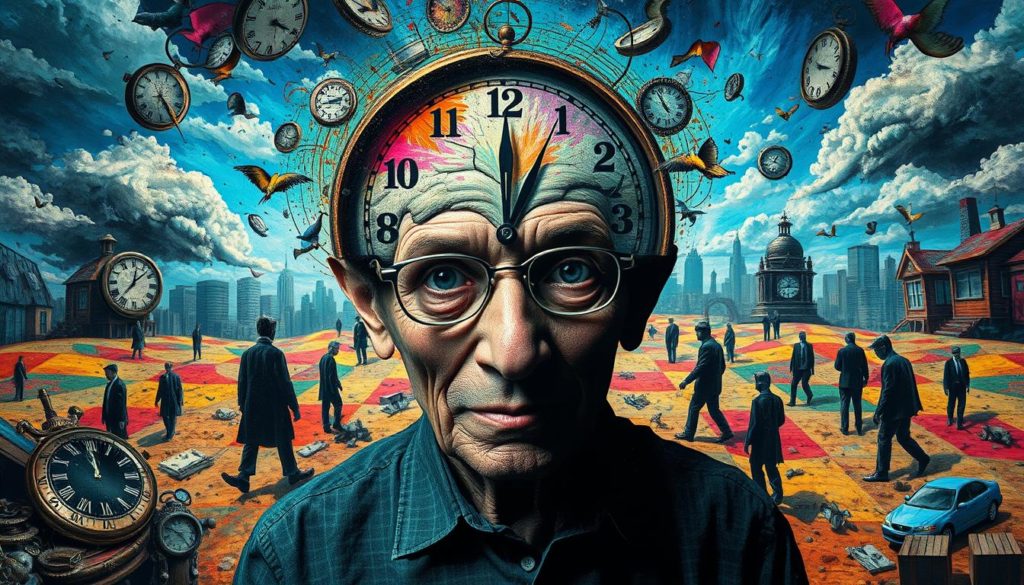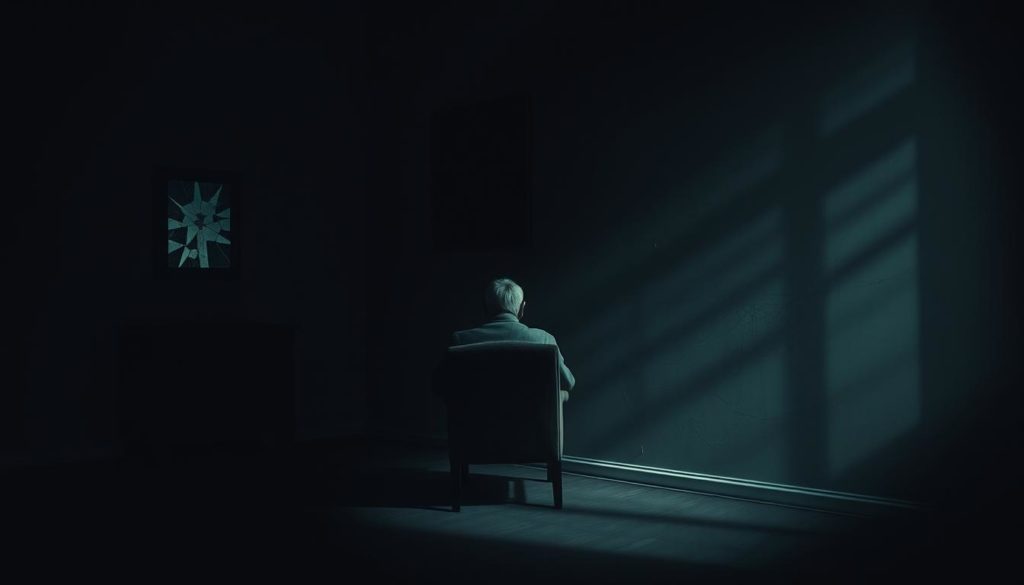Did you know up to half of people with dementia will face psychosis? This fact highlights the critical need for better understanding and action.
Hallucinations, delusions, and paranoia are key aspects of this challenge. They greatly impact the well-being of both patients and caregivers. Handling psychosis in dementia demands careful, patient strategies.
Researchers work hard to find better treatments for cognitive decline. Meanwhile, caring with compassion is key. It’s vital to explore treatments carefully, weighing their pros and cons. The path through dementia-related psychosis varies greatly, needing flexible and kind care.
Understanding Dementia and Psychosis
To really understand the link between dementia and psychosis, we need to know what dementia is first. It’s also key to learn how it shows up with psychotic actions.
What is Dementia?
Dementia is a term for conditions with decreased brain function. People with it may lose memory, struggle to communicate, and get confused. Alzheimer’s disease is one of many types, but it’s the most common. Changes in the brain from Alzheimer’s can cause dementia patients to act out in psychotic ways.

Psychosis in Dementia: An Overview
The way dementia and psychosis are connected is hard to pin down. Dementia can lead to seeing things that aren’t there, believing things that aren’t true, and feeling overly suspicious. These problems can show up in Alzheimer’s, Lewy body dementia, and Parkinson’s disease dementia. About 70% of those with dementia may have psychosis at some point. This high number shows why it’s crucial for doctors and those caring for someone with dementia to really understand what they’re dealing with.
Signs and Symptoms of Dementia-Related Psychosis
It’s vital to spot psychosis in dementia for proper care. Signs include dementia hallucinations, delusional thoughts, and paranoia. These signs vary with the type of dementia.
Hallucinations
People with dementia might see or hear things that aren’t real. These hallucinations can be visual or auditory. They’re often seen in those with Lewy body dementia. A person may see figures or animals that aren’t actually there, causing confusion.
Delusions
Delusional thoughts are frequent in dementia-related psychosis. These are false beliefs not based on reality. For example, a person may think a loved one is stealing from them. Or they might believe an imposter has taken their spouse’s place. This can affect how they act and their relationships.
Paranoia
Paranoia in dementia leads to baseless suspicions and distrust. Sufferers may think others want to hurt them or they’re being spied on. This paranoia makes caregiving tough, complicating daily interactions and routines.

Knowing these signs—hallucinations, delusional thoughts, and paranoia—helps identify dementia psychosis. This knowledge is key for customized care strategies.
| Symptom | Manifestation | Common Type of Dementia |
|---|---|---|
| Hallucinations | Seeing or hearing non-existent things | Lewy Body Dementia |
| Delusions | False beliefs like theft or identity replacement | Alzheimer’s Disease |
| Paranoia | Irrational suspicions and distrust | Variable |
Causes of Dementia-Related Psychosis
The causes of psychosis in dementia are complex and different. They often relate to certain brain conditions. This part talks about the main reasons behind psychosis in people with dementia.
Alzheimer’s Disease and Brain Changes
Alzheimer’s disease is a top reason for psychosis in dementia. Brain changes in Alzheimer’s lead to false beliefs and paranoia. These changes include the buildup of harmful substances in the brain.
Such substances mess up how brain cells talk to each other. This mess-up causes trouble with thinking and seeing things correctly.
Lewy Body Dementia
Lewy body dementia also causes psychosis in dementia. It happens because of unusual protein bits called Lewy bodies in the brain. Lewy body-associated psychosis comes from these bits disturbing brain cell work. This can make people see things that aren’t there, among other symptoms.
Parkinson’s Disease Dementia
Psychosis in Parkinson’s disease dementia often starts with medicines used to treat it. Parkinson’s medication effects might make patients see or believe things that are not real. Over time, as the disease gets worse, the brain’s levels of an important chemical drop. This drop leads to more psychotic symptoms.
Risk Factors for Dementia-Related Psychosis
Dementia-related psychosis is complex and influenced by many factors. Knowing these factors helps us come up with better prevention and treatment.
Genetics
Genetics matter a lot in dementia-related psychosis. If your family has a history of dementia, your own risk may be higher. Research points to certain genes that might increase risk, showing how this disorder can run in families.
Environmental Triggers
Aside from genetics, the environment plays a role too. Things like pollution, stress, and shocking events could trigger dementia psychosis. These factors are not as clear but are still important.
Medical Conditions
Having chronic diseases or other mental health issues can also increase your risk. Diseases like diabetes, heart issues, and brain injuries have a big effect. By understanding how these conditions interact, doctors can create better treatment plans.
Behavioral and Psychological Symptoms in Dementia
Dementia brings many challenges, including behavioral and psychological symptoms. Understanding these issues is key to giving the right care. It helps meet the unique needs of those affected.
Aggression and Agitation
Aggression and agitation are dementia behavioral symptoms seen often. They come from the frustration of losing cognitive functions and adjusting to new environments. These behaviors can be verbal or physical, making daily care hard for caregivers.
Depression
Dementia-related depression deeply affects life quality. It happens because cognitive decline leads to sadness, loss of hope, and less socializing. It’s vital to address this depression to help patients feel better and reduce other symptoms.
Sleep Disorders
Sleep problems are common in dementia and can worsen other symptoms. This includes “sundowning,” which brings confusion and agitation in the evening. It makes caregiving more complex and affects the rest of patients and caregivers alike.
Addressing these symptoms as a whole is crucial. It improves the lives of those with dementia. They deserve care filled with compassion.
Complications of Dementia-Related Psychosis
Dementia-related psychosis often leads to serious challenges. It affects both the person with dementia and those who care for them. The problems it causes can make dementia get worse faster. This makes the person’s overall health decline more quickly.
One big problem is the higher chance of getting hurt. Misunderstandings and difficulties in communication can create unsafe situations. This makes caring for someone with advanced dementia even harder. Caregivers struggle to keep the person safe while dealing with hard to predict and sometimes aggressive behavior.
This issue also leads to more medical care and higher costs. There are more visits to the hospital, more medical treatments, and the need for special care. This can be hard on both money and the emotions of those who provide care. So, it’s important to handle these problems with a plan that looks at all the different challenges they cause.
The table below shows how dementia-related psychosis affects both patients and caregivers:
| Complication | Impact on Patient | Impact on Caregiver |
|---|---|---|
| Injury Risk | Higher rates of falls and related injuries. | Increased vigilance and stress in monitoring patient safety. |
| Communication Barriers | Difficulties in expressing needs and experiences. | Frustration due to misunderstandings and misinterpretations. |
| Healthcare Costs | Frequent medical visits and higher treatment expenses. | Financial strain and emotional burden. |
| Behavioral Issues | Agitation, aggression, and other disruptive behaviors. | Challenges in managing and calming the patient. |
To handle these problems well, we need to really understand them. We also need plans that can help both now and in the future. This is vital for everyone touched by dementia-related psychosis.
Impact on Caregivers
Caring for someone with dementia-related psychosis brings many caregiver challenges. The emotional toll is especially heavy. Caregivers face the unpredictable symptoms of dementia. They often struggle with their own mental health. This highlights the need for effective stress reduction techniques.
Emotional Challenges
Caregivers face a heavy emotional burden. They must be constantly vigilant. They also struggle to understand and manage delusions and hallucinations.
This leads to increased anxiety and emotional fatigue. Understanding dementia-related psychosis is key. It helps in dealing with these emotional challenges, as shown here.
Managing Stress
Stress management is crucial in dementia care management. Techniques like mindfulness and exercise help a lot. So does having a strong support network.
Good communication and professional help are important. These strategies help caregivers not just survive but thrive in their roles.
Non-Pharmacological Management Strategies
For individuals with dementia-related psychosis, non-drug treatments are a beacon of hope. They improve quality of life without using medications. Focus on environmental strategies for dementia, compassionate caregiver tactics, and activities for cognitive engagement. These are vital in this approach.
Environmental Adjustments
Modifying the living area is a key environmental strategy for dementia. It helps lessen hallucinations or paranoia triggers. By optimizing lighting, lowering noise, and using familiar items, a safer environment is created. These steps also reduce stress and increase security.
Caregiving Approaches
Using empathetic caregiver tactics is essential for managing dementia symptoms. Caregivers need to communicate gently, offer reassurance, and listen actively. These methods build trust and improve the caregiving relationship. It’s also crucial to give caregivers regular breaks to avoid burnout.
Engaging Activities
Activities that engage the mind are great for mental health in dementia. Puzzles, music therapy, art, and gentle exercise stimulate the brain and calm agitation. They also boost mood and help with socializing.
Pharmacological Treatment Options
Treating dementia effectively means looking at cognitive issues and behavioral changes like psychosis. Let’s explore the different drugs used in treatment.
Antipsychotics
Antipsychotics help manage dementia symptoms like seeing things that aren’t there. Medicines like risperidone and olanzapine are often chosen, though results differ. It’s key to weigh their benefits against risks, such as higher stroke risk and death in the elderly.
SSRIs
SSRIs treat depression and worry in dementia patients. Drugs such as sertraline and citalopram are common choices. But, watching for side effects, like stomach issues and clashes with other meds, is crucial.
Experimental Treatments
Research is always looking for new ways to ease psychosis in dementia sufferers. Things like cannabinoids and new drug therapies show promise. They’re still being tested, so we need to learn more about their effects through thorough studies.
| Medication | Use in Dementia | Common Side Effects |
|---|---|---|
| Risperidone | Antipsychotic for delusions and aggression | Stroke risk, drowsiness |
| Sertraline | SSRI for depression and anxiety | Nausea, dry mouth |
| Cannabinoids | Experimental treatment for psychosis | Unknown, under research |
Balancing Risks and Benefits of Medications
When looking at dementia meds, it’s vital to analyze the risks and benefits thoroughly. These drugs can ease symptoms and make life better. But, they also have downsides, like higher death rates and the chance of making symptoms worse.
“Every medication decision must be personalized and continuously re-evaluated to ensure the best outcomes for individuals with dementia.”
Checking the medications often is a must for dementia care. Doctors should always make sure the meds are still working well. This is because dementia can change over time.
- Potential for reduced psychosis
- Improved behavioral control
- Adverse effects risk
- Regular need for reassessment
The table below clearly shows what to think about when looking at dementia meds:
| Factor | Risks | Benefits |
|---|---|---|
| Symptom Management | Adverse effects | Reduced psychosis |
| Behavioral Control | Worsening symptoms | Improved behavior |
| Mortality Rates | Increased | – |
| Regular Assessments | Time and resources | Personalized treatment |
In the end, managing dementia with meds requires a careful balance. By always evaluating, we can lower risks and increase the good it does.
Future Research and Developments
As we look to the future, ongoing research in dementia is key. We aim to create treatments that are safe and work well. Personalized therapies are becoming more important. This means making treatments that match the unique needs of each person.
This approach could greatly help those dealing with dementia. It offers hope and significant relief.
Another important goal is understanding the brain chemistry linked to dementia. Exploring the brain’s complex functions helps researchers find new ways to manage cognitive disorders. This effort could lead to groundbreaking therapies for dementia patients.
These advances promise better outcomes and a higher quality of life.
Research continues to be essential for finding new treatments for psychosis. The future of treatments relies on understanding the root causes of dementia-related psychosis. Through persistent research efforts, we keep pushing towards groundbreaking treatments.
This dedication could lead us to discover effective solutions. It is a step towards a hopeful future for those with dementia.
FAQ
What is Dementia?
Dementia is a term used for conditions that lead to cognitive decline. This includes memory loss and having trouble with communication and confusion. The most common type is Alzheimer’s disease.
What are the signs and symptoms of dementia-related psychosis?
Signs of dementia-related psychosis include seeing or hearing things that aren’t real. People may also hold false beliefs, like someone taking their things. They might also feel overly suspicious or distrustful.
Can you explain the complications of dementia-related psychosis?
This condition can make cognitive decline worse. It ups the chance of getting hurt and stresses caregivers. It also leads to more healthcare needs, raising costs.
What are the common risk factors for developing dementia-related psychosis?
Some risks are genetic factors, environmental factors, and other health issues. This includes mental health disorders or brain injuries.
How does one manage the symptoms of dementia-related psychosis without medication?
Managing without meds involves making the environment less triggering. Caregivers should use empathy, avoid confrontations, and keep the person active with various activities.
What treatment options are available for dementia-related psychosis?
Treatments include antipsychotics and SSRIs. There are also new treatments being studied like cannabinoids. The key is weighing benefits against side effects.
How does dementia-related psychosis affect the mental health of caregivers?
Caregivers may feel overwhelmed and stressed. They need ways to handle stress, good communication skills, and support to stay strong and effective.
What advancements are being made in the research and treatment of dementia-related psychosis?
Research is working on safer, more effective treatments. This includes personalized treatments based on risk factors and understanding the brain’s changes in dementia.
How do symptoms of dementia-related psychosis vary between different types of dementia?
Symptoms differ by dementia type. For instance, visual hallucinations are more common in Lewy body dementia. In contrast, delusions are more linked to Alzheimer’s. Each dementia type requires different management approaches for psychosis.
What are some effective strategies for stress management for caregivers of individuals with dementia?
Strategies for caregivers include taking breaks, getting support, joining groups, and doing stress-reduction activities. Activities like meditation or exercise can be very helpful.


